Secretary of State for War and the Colonies
The Secretary of State for War and the Colonies was a British cabinet-level position responsible for the army and the British colonies (other than India). The Department was created in 1801. In 1854 it was split into the separate offices of Secretary of State for War and Secretary of State for the Colonies. The Secretary was supported by an Under-Secretary of State for War and the Colonies.
| Secretary of State for War and the Colonies | |
|---|---|
.svg.png.webp) Royal Arms used by Her Majesty's Government | |
| Style | The Right Honourable [Note 1] |
| Member of | Cabinet · Privy Council · Parliament |
| Appointer | Monarch of the United Kingdom based on advice of the Prime Minister |
| Term length | At Her Majesty's pleasure |
| Formation | 17 March 1801 |
| First holder | The Lord Hobart |
| Final holder | The Duke of Newcastle |
| Abolished | 10 June 1854 |
| Succession | Secretary of State for War · Secretary of State for the Colonies |
| Deputy | Under-Secretary of State for War and the Colonies |
List of Secretaries of State for War and the Colonies (1801–1854)
| Portrait | Name (Birth–Death) |
Term of office | Party | Ministry | Monarch (Reign) | ||
|---|---|---|---|---|---|---|---|
 |
Robert Hobart Baron Hobart (1760–1816) |
17 March 1801 |
12 May 1804 |
Tory | Addington | George III.svg.png.webp) (1760–1820) [Note 2] | |
%252C_Marquis_Camden_by_William_Salter.jpg.webp) |
John Pratt 2nd Earl Camden (1759–1840) |
14 May 1804 |
10 July 1805 |
Tory | Pitt II | ||
 |
Robert Stewart Viscount Castlereagh MP for Boroughbridge (1769–1822) |
10 July 1805 |
5 February 1806 |
Tory | |||
 |
William Windham MP for New Romney (1750–1810) |
5 February 1806 |
25 March 1807 |
Whig | All the Talents (Whig–Tory) | ||
 |
Robert Stewart Viscount Castlereagh MP for Plympton Erle (1769–1822) |
25 March 1807 |
1 November 1809 |
Tory | Portland II | ||
.jpg.webp) |
Robert Jenkinson 2nd Earl of Liverpool (1770–1828) |
1 November 1809 |
11 June 1812 |
Tory | Perceval | ||
 |
Henry Bathurst 3rd Earl Bathurst (1762–1832) |
11 June 1812 |
30 April 1827 |
Tory | Liverpool | ||
George IV.svg.png.webp) (1820–1830) | |||||||
 |
F. J. Robinson 1st Viscount Goderich (1782–1859) |
30 April 1827 |
3 September 1827 |
Tory | Canning (Canningite–Whig) | ||
 |
William Huskisson MP for Liverpool (1770–1830) |
3 September 1827 |
30 May 1828 |
Tory | Goderich (Canningite–Whig) | ||
 |
Sir George Murray MP for Perthshire (1772–1846) |
30 May 1828 |
22 November 1830 |
Tory | Wellington–Peel | ||
William IV.svg.png.webp) (1830–1837) | |||||||
 |
F. J. Robinson 1st Viscount Goderich (1782–1859) |
22 November 1830 |
3 April 1833 |
Whig | Grey | ||
.jpg.webp) |
Edward Smith-Stanley MP for North Lancashire (1799–1869) |
3 April 1833 |
5 June 1834 |
Whig | |||
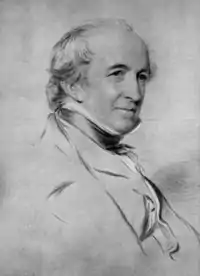 |
Thomas Spring Rice MP for Cambridge (1790–1866) |
5 June 1834 |
14 November 1834 |
Whig | Melbourne I | ||
 |
Arthur Wellesley 1st Duke of Wellington (1769–1852) |
17 November 1834 |
9 December 1834 |
Tory | Wellington Caretaker | ||
 |
George Hamilton-Gordon 4th Earl of Aberdeen (1784–1860) |
20 December 1834 |
8 April 1835 |
Conservative | Peel I | ||
 |
Charles Grant 1st Baron Glenelg (1778–1866) |
18 April 1835 |
20 February 1839 |
Whig | Melbourne II | ||
Victoria.svg.png.webp) (1837–1901) | |||||||
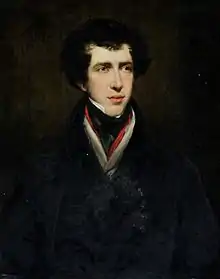 |
Constantine Phipps 1st Marquess of Normanby (1797–1863) |
20 February 1839 |
30 August 1839 |
Whig | |||
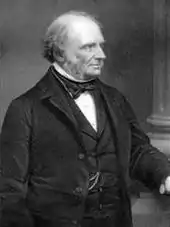 |
Lord John Russell MP for Stroud (1792–1878) |
30 August 1839 |
30 August 1841 |
Whig | |||
.jpg.webp) |
Edward Smith-Stanley Baron Stanley of Bickerstaffe (1799–1869) [Note 3] |
3 September 1841 |
23 December 1845 |
Conservative | Peel II | ||
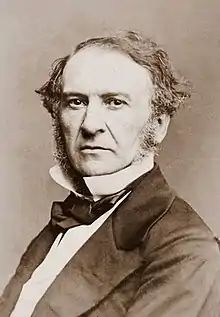 |
William Ewart Gladstone (1809–1898) [Note 4] |
23 December 1845 |
27 June 1846 |
Conservative | |||
 |
Henry Grey 3rd Earl Grey (1802–1894) |
6 July 1846 |
21 February 1852 |
Whig | Russell I | ||
 |
Sir John Pakington Bt MP for Droitwich (1799–1880) |
27 February 1852 |
17 December 1852 |
Conservative | Who? Who? | ||
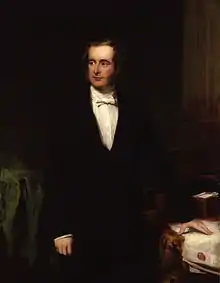 |
Henry Pelham-Clinton 5th Duke of Newcastle (1811–1864) |
28 December 1852 |
10 June 1854 |
Peelite | Aberdeen (Peelite–Whig) | ||
- Notes
- Typical style for members of the Privy Council and peers ranked below Marquess. For peers of the rank Marquess The Most Honourable; for peers of the rank Duke His Grace.
- The Prince of Wales served as Prince Regent from 5 February 1811.
- MP for North Lancashire until 1844; thereafter summoned to Parliament through a writ in acceleration in respect of his father's title, Baron Stanley of Bickerstaffe.
- On appointment to office a ministerial by-election was triggered in the Newark-upon-Trent constituency that Gladstone had represented since 1832. Gladstone did not contest the seat, and was not returned to Parliament until the 1847 general election.
This article is issued from Wikipedia. The text is licensed under Creative Commons - Attribution - Sharealike. Additional terms may apply for the media files.